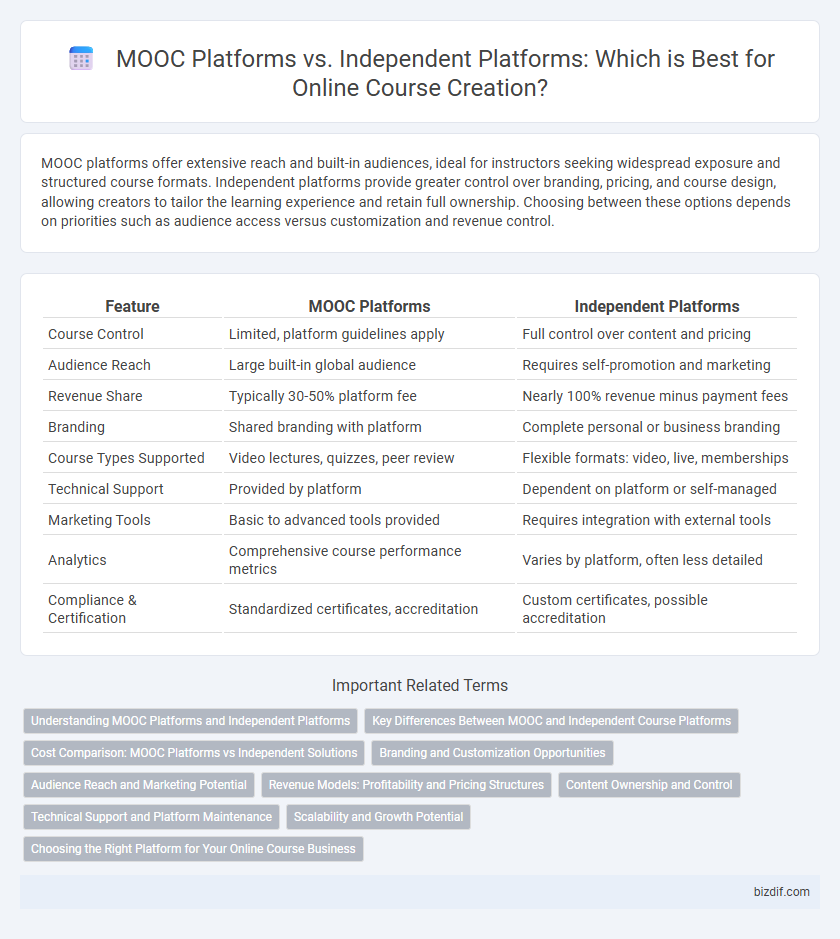MOOC platforms offer extensive reach and built-in audiences, ideal for instructors seeking widespread exposure and structured course formats. Independent platforms provide greater control over branding, pricing, and course design, allowing creators to tailor the learning experience and retain full ownership. Choosing between these options depends on priorities such as audience access versus customization and revenue control.
Table of Comparison
| Feature | MOOC Platforms | Independent Platforms |
|---|---|---|
| Course Control | Limited, platform guidelines apply | Full control over content and pricing |
| Audience Reach | Large built-in global audience | Requires self-promotion and marketing |
| Revenue Share | Typically 30-50% platform fee | Nearly 100% revenue minus payment fees |
| Branding | Shared branding with platform | Complete personal or business branding |
| Course Types Supported | Video lectures, quizzes, peer review | Flexible formats: video, live, memberships |
| Technical Support | Provided by platform | Dependent on platform or self-managed |
| Marketing Tools | Basic to advanced tools provided | Requires integration with external tools |
| Analytics | Comprehensive course performance metrics | Varies by platform, often less detailed |
| Compliance & Certification | Standardized certificates, accreditation | Custom certificates, possible accreditation |
Understanding MOOC Platforms and Independent Platforms
MOOC platforms such as Coursera, edX, and Udacity provide access to large audiences through established infrastructure, standardized course formats, and built-in marketing tools. Independent platforms like Teachable, Thinkific, and Kajabi offer greater control over branding, pricing, and content delivery, allowing instructors to tailor their courses and retain higher revenue shares. Choosing between MOOC and independent platforms depends on factors like target audience reach, customization needs, and long-term business goals.
Key Differences Between MOOC and Independent Course Platforms
MOOC platforms like Coursera and edX offer extensive, university-affiliated courses to millions of users worldwide, emphasizing standardized curricula and peer collaboration, whereas independent course platforms such as Teachable and Thinkific empower individual creators with full control over course design, pricing, and marketing. MOOC platforms often provide certification and degree options linked with established academic institutions, while independent platforms focus on flexibility, customization, and direct monetization for instructors. The scalability and audience reach differ significantly, with MOOC platforms leveraging large user bases, whereas independent platforms rely heavily on creators' marketing efforts and niche targeting.
Cost Comparison: MOOC Platforms vs Independent Solutions
MOOC platforms often offer lower upfront costs due to shared resources and established audiences, but they typically charge revenue-sharing fees or subscription percentages that reduce long-term earnings. Independent platforms require higher initial investments for hosting, marketing, and technology but allow course creators full control over pricing and retain 100% of their revenue. Evaluating the total cost of ownership and potential profit margins is crucial when choosing between MOOC platforms and independent solutions for online course creation.
Branding and Customization Opportunities
MOOC platforms offer extensive reach and established audiences but limit branding and customization options, often maintaining platform logos and standardized course layouts. Independent platforms provide full control over branding elements such as logos, color schemes, and domain names, allowing course creators to tailor the user experience and strengthen brand identity. Customization opportunities on independent platforms also enable advanced integrations and personalized marketing tools that enhance learner engagement and business growth.
Audience Reach and Marketing Potential
MOOC platforms like Coursera and edX boast extensive global audiences, providing course creators with built-in traffic and credibility that significantly enhance marketing potential. Independent platforms such as Teachable or Thinkific offer greater control over branding and customer data but require creators to invest heavily in marketing to attract and grow their audience. Choosing between the two depends on whether reach through established marketplaces or tailored marketing strategies aligns best with the course creator's goals.
Revenue Models: Profitability and Pricing Structures
MOOC platforms typically generate revenue through subscription fees, freemium models, and corporate partnerships, often sharing a significant portion of profits with course creators. Independent platforms offer creators full control over pricing strategies, enabling flexible revenue models such as one-time purchases, memberships, or tiered access, which can result in higher profitability per course. Understanding the differences in pricing structures and profit-sharing policies is crucial for maximizing earnings in online course creation.
Content Ownership and Control
MOOC platforms typically retain significant control over course content, often enforcing strict guidelines and limiting customization options, which can restrict an instructor's creative freedom and content ownership. Independent platforms grant creators full ownership and extensive control over their courses, allowing flexible content management, pricing, and branding strategies. Choosing independent platforms ensures educators maintain intellectual property rights and have the autonomy to update or modify their courses without external limitations.
Technical Support and Platform Maintenance
MOOC platforms provide robust technical support and regular platform maintenance managed by dedicated teams, ensuring seamless course delivery and system reliability for large-scale audiences. Independent platforms often require instructors to handle technical issues and maintenance themselves or rely on third-party services, which can lead to varied user experiences and downtime risks. The choice between MOOC and independent platforms significantly impacts the level of technical support and overall course stability.
Scalability and Growth Potential
MOOC platforms like Coursera and edX offer extensive scalability by leveraging large user bases and established infrastructures, enabling rapid course enrollment growth. Independent platforms provide greater control over branding and pricing strategies, fostering customized growth paths tailored to niche audiences. Both options present unique scalability advantages, with MOOCs excelling in mass reach and independent platforms optimizing for sustained, organic expansion.
Choosing the Right Platform for Your Online Course Business
MOOC platforms like Coursera and Udemy offer vast audiences and built-in marketing tools, ideal for reaching thousands of learners quickly. Independent platforms such as Teachable and Thinkific provide greater control over branding, pricing, and student data, essential for building a unique course business. Selecting the right platform depends on your goals for scalability, customization, and revenue ownership in your online course business.
MOOC platforms vs Independent platforms Infographic

 bizdif.com
bizdif.com